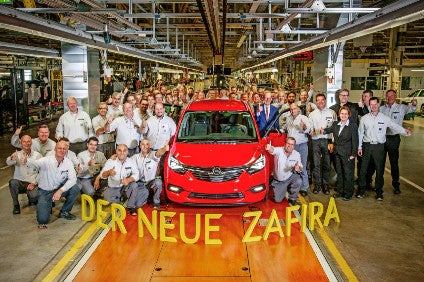We could see a framework deal for Peugeot’s acquisition of GM’s Opel/Vauxhall operations by the end of this week. The two are clearly at an advanced stage in the discussions and are reportedly at the point of putting a value on the deal. There’s a lot to take into account, though, so don’t be too surprised if it drags on.
Naturally, there is plenty of speculation on how the enlarged company may rationalise a bigger production network to take out cost. Vauxhall’s UK Ellesmere Port plant that makes the Astra could be vulnerable when you consider that it exports 88% of its output – most of it to Europe – and imports all major parts from the EU. Anything that puts added cost on that cross-border trade is a worry.
However, exchange rate movement since the summer – sterling depreciation versus the euro of over 10% – lifts margins on Astras shipped from the UK to the eurozone (costs in cheaper pounds, sales in euros). That helps the UK plant. But on the negative side, the gain is partially compensated by the movement of major parts in the other direction which means those costs in pounds will not be as low in euros as the exchange rate suggests. It is a bit swings and roundabouts. The main problem on exchange rates for GM is imports of other cars to the UK market from eurozone plants. They will be under big margin pressure straight away; there are no compensatory cushions (I doubt GM opted to pay significant sums for sterling-euro currency hedging) and small cars like the Corsa tend to come with razor-slim margins. Raising prices is difficult right now, too (a very competitive UK market). I suspect the import of cars to the UK from eurozone plants is the main source of GM’s latest European losses, rather than the operation of UK plants themselves.
The main problem facing those UK manufacturing operations is medium-term in nature: How will post-Brexit trading arrangements (departure set for spring 2019) impact their competitiveness? Trade costs could rise significantly and the ongoing losses in Europe add urgency to the question. This is extremely uncomfortable territory for the UK government, politically. No government wants a major car plant closure on its hands, but the UK government has yet to negotiate how the post-Brexit trading arrangements – or any transition to a trade deal that may take five years or more to conclude – will actually look. The political priority has been to say that migration has to be controlled and thus far, the UK position appears to be that the UK will therefore leave the European single market. That, at the very least, raises the likelihood of increased costs – whether tariffs and/or non-tariff costs applying to cross-border shipments of goods.
There are various levers that the UK government may want to explore to compensate firms with plants in the UK so that their net competitive position – in whatever scenarios considered – is not impaired, post-Brexit. PSA chief Carlos Tavares will undoubtedly be interested to hear what the UK prime minister, Theresa May, has to say on that when he meets her (soon). This Carlos, like the last one (Nissan’s Ghosn), will be after any concessions or assurances he can get. What assurances can she reasonably offer? She has to be very careful what she says. It’s a very delicate area just ahead of the start of the Brexit negotiations next month; Brussels, Berlin and Paris are sure to be keeping a very close eye on this subject.
When PSA does its due diligence though, it should become aware of the underlying competitive position and productivity of all of its plants, all factors taken into account. And GM’s latest exchange rate losses in Europe perhaps illustrate the advantages of having some natural hedging from manufacturing in the UK sterling area. Whatever happens, the UK car market is a major one in Europe. And the UK plants could, eventually, make other vehicles as part of a larger PSA-owned group that is sharing platforms and engineering with Opel, for bigger scale economies. Electrification opens up a number of strategic possibilities. UK plants and the UK labour market are also relatively flexible, at least. The UK government is certainly in the mood to be supportive.
It may be some time before the new larger company settles on its European manufacturing structure. How will its highly integrated European supply chain look though, in respect of UK-EU shipments (in both directions) and the rules and costs that will apply from 2019? We just don’t know and there is a lot of negotiating to be done before we have a good indication of where that is heading. Mrs May – and the officials briefing her – will need to be on top of their game when Mr Tavares comes to London. The ball is in Mrs May’s court and it will be a tricky one to return. There will be more.







